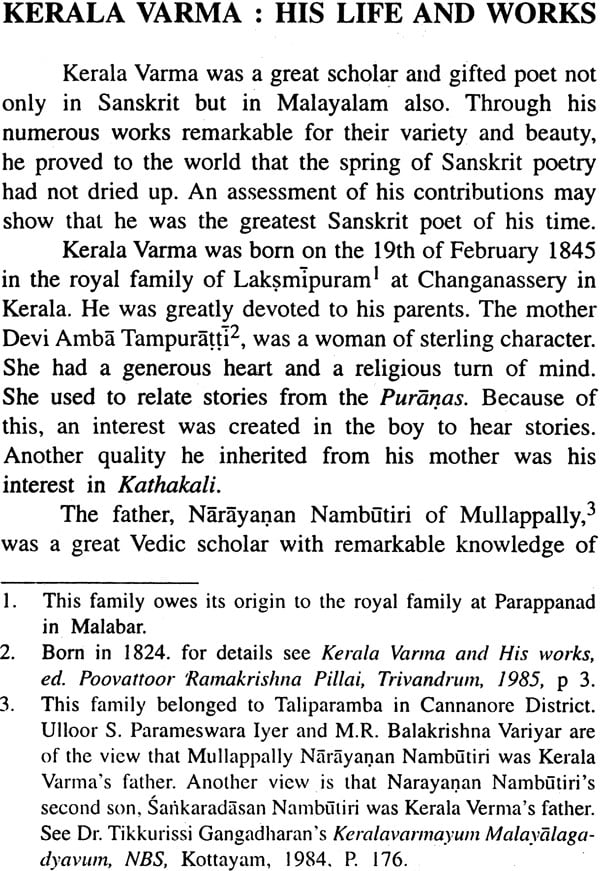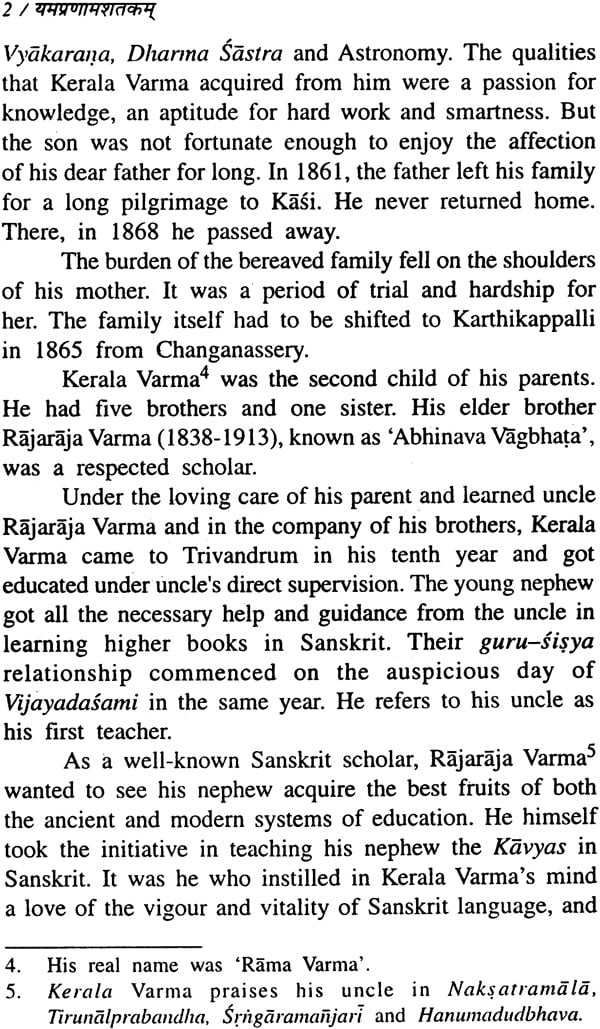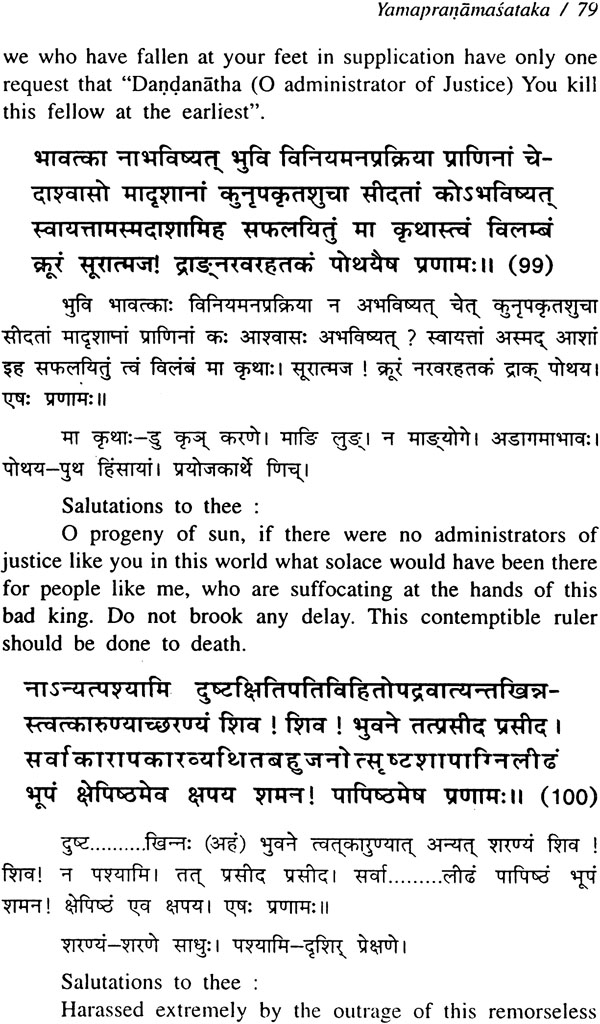
Yamapranamasataka (A Century of Salutations to the God of Death) of Kerala Varna
Book Specification
| Item Code: | IDJ464 |
| Author: | Har |
| Publisher: | New Bharatiya Book Corporation |
| Language: | English & Sanskrit |
| Edition: | 2005 |
| ISBN: | 8183150187 |
| Pages: | 96 |
| Cover: | Hardcover |
| Other Details | 8.5 inch X 6.0 inch |
| Weight | 240 gm |
Book Description
From the Jacket
Rhetoricians have enumerated the purposes of poetry differently as catering to the interests of poets and readers. They include fame, financial benefits, wordly prosperity, pleasure, knowledge, supreme bliss, transactions of the world and warding off evils. These are only indicative and not exclusive. There could be other useful purposes and well. It is in this respect that the present work Yamapranamasataka-a century of verses in salutation of the god of death deserves our attention. It is in fact a sequel to another piece of work which again is drafted to serve another strange purpose that of pacification.
It is the Kampanasahasra - a thousand verses in apology coming from the pen of the same author. Thus pacification and destruction of the enemy may also be included among the purposes of poetry, though this feature is not ordinarily met with. But then, our author was an extraordinary genius and the trials and tribulations that wracked havoc in his life are again of extraordinary nature. To use a modern usage it was like a 'tsunami' of some sort that called for a special treatment at the hands of a scholar-poet of rare accomplishments.
The two woks mentioned here - both composed by the same author Kerala Varma and both edited by the same modern scholar, Dr. Poovatoor Ramakrishna Pillai, present a rare aspect of poetry and a unique contribution by an author of Kerala origin.
About the Author
Dr. Poovattoor Ramakrishna Pillai (b. 1935) took his M. A. degree in Sahitya with First Class from the University of Kerala. He received from the same University M A. degrees in Vedanta and Malayalam, M. Phil degree for his dissertation of Swati Thirunal's 'Bhaktimanjari' and Ph. D. for his thesis 'Visakhavijaya - A Study.
After serving as Lecturer in Sahitya in the Government Sanskrit College, Thiruvananthapuram for some time, he joined the Devaswom Board College, Sasthamcotta in 1967 as Lecturer in Sanskrit. In 1978 he was promoted as Professor and Head of the Department of Sanskrit. In 1986 he became Principal of the same College. In 1988 he was appointed as Assistant Editor in the Kerala State Institute of Encyclopaedic Publications, Thiruvananthapuram, and in 1990 Visiting Editor in the same Institute.
He has to his credit works such as Kerala Varma and His Works, Visakhavijaya-A Study, Sanskrita Samiksa, Candrapida candrapida Caritam, Bhaktimajnari - A Study Svapnavasavadattam (Malayalam commentary), Mahaccaritamala and several research papers on various topics.
Foreword
Rhetoricians have enumerated the purposes of poetry differently as catering to the interests of poets and readers. They include fame, financial benefits, worldly prosperity, pleasure, knowledge, supreme bliss, worldly prosperity, pleasure, knowledge, supreme transactions of the world and warding off evils. These are only indicative and not exclusive. There could be other useful purpose as well. It is in this respect that the present work Yamapranamasataka - century of verses in salutation of the god of death deserves our attention. It is in fact a sequel to another piece of work which again is drafted to serve another strange purpose - that of pacification. It is the Ksamapanasahasra - a thousand verses in apology-coming from the pen of the same author. Thus pacification and destruction of the enemy may also be included among the purposes of poetry, though this feature is not ordinarily met with. But then, our author was an extraordinary genius and the trials and tribulations that wreaked havoc in his life are again of extraordinary nature. To use a modern usage it was like a 'tsunami' of some sort that called for a special treatment at the hands of a scholar-poet of rare accomplishments.
The two works mentioned here - both composed by the same author, Kerala Varma and both edited by the same modern scholar, Dr. Poovattoor Ramakrishna Pillai, present a rare aspect of poetry and a unique contribution by an author of Kerala origin. Poetry which is hard to understand is termed as belonging to Nalikerapaka (as in the cases of Magha and Sriharsa). But one could not remain complacent by including the Yamapranamasataka under this category. It requires a special skill to understand and explain since it is vyakhyagamya relishable only with the help of a commentary as in the case of a sastrakavya like Bhattikavya. It is here that the resources and experience of Dr. Pillai have been put to use.
Kerala Varma is no ordinary author. He is likened to Sri Harsha by Kerala historians of literature, but then not without sufficient reasons. His voluminous contributions to different fields of Sanskrit literature and sastras speak of the extraordinary genius that he was. Dr. Pillai has a special liking for this author of rare achievement. It is this that prompted him to collect the Sanskrit works of the author in a compact volume, in addition to preparing a Doctoral thesis on Visakhavijaya historical and biographical Mahakavya of Kerala Varma. I am glad to note that he has imbibed the spirit of the great author who has enriched the Sanskrit literature of Kerala by his multifarious contributions.
| Foreword | V-VI |
| Preface | VII-VIII |
| Abbreviations | IX |
| Introduction | 1-15 |
| Yamapranamasataka - a sequel | 16-22 |
| Yamprnamashatkam | 23-80 |
| Shlokanukrmanika | 81-82 |









